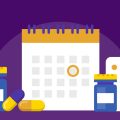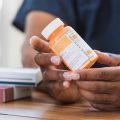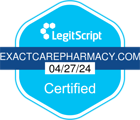
Understanding Common Medication Terms
You’ve probably heard or read words related to your medication that you didn’t understand. That’s completely normal. Medication terms are confusing for a lot of people.
Below are some of the most common medication terms used by doctors and pharmacists. Getting to know these terms and what they mean can help you be more informed about your health and the care you receive.
Common Medication Terms
Adverse reaction. An unwanted or dangerous reaction to a prescription or non-prescription drug or supplement. Reactions can be mild, moderate or severe. They can happen even when you a take a drug properly.
Allergy. Your body’s overreaction to an otherwise harmless substance, including medication. Common symptoms include skin rashes, hives, itching, wheezing, chest tightness, shortness of breath, congestion and coughing. You may experience symptoms right after taking a drug for the first time, or they could develop later.
Brand name medication. These drugs are the first of their kind. They are named by the company that produced them. An example is Lipitor, a drug that treats high cholesterol. The generic for Lipitor is atorvastatin.
Controlled substances. Specific prescription drugs that are regulated by the government because they have the potential to be abused. The control of these drugs is meant to keep people from becoming addicted or being harmed.
Copayment / Copay. A fixed dollar amount you are required to pay out of pocket for your covered medications. Your copay is set by your insurance plan.
Drug or medication regimen. A treatment plan that specifies the dosage, the schedule, and the duration of treatment.
Dose and dosage. A dose is a measured amount of medicine to be given at one time. Dosage refers to how many times the dose is taken over a period of time. For example, you may be advised to take one dose – that’s 200mg or 1 pill – of Ibuprofen every 4 to 6 hours for headache relief.
Generic medication. These drugs become available years after the brand name version and go by a different name. They are required to have the same active ingredients as the brand name option and must provide the same clinical benefits. Generic drugs often cost less than brand name drugs, but work exactly the same way.
Interaction. The way a drug changes how it works in the body when taken with certain other drugs, food, beverages or supplements. An interaction can cause a drug to be less effective or unsafe.
Maintenance medication. Drugs you take on a daily basis for the long term to stay healthy and treat chronic medical conditions.
Med sync. The process a pharmacy uses to line up the dates of your prescription refills. This allows you to receive all your medications at the same time every month. [Read more about the benefits of med sync.]
Open enrollment. The period of time every year when you can sign up for or make changes to your health and prescription insurance plans. Medicare open enrollment period is October 15 – December 7.
Over-the-counter or OTC medications. Medication that does not require you have a prescription to buy it. Your insurance may covers some OTC medication costs, but you often have to pay for these out of pocket.
Preferred pharmacy network. A group of pharmacies your insurance plan prefers that you use. Typically, you can save money on copays by using a pharmacy in your plan’s preferred network.
Prescription drug. Medicine you can only get with a prescription from a provider.
Prescription refill. The number of times you can get more of the medication without having to go back to their office. Your provider decides how many refills you can get before you should stop taking your medication or get a new prescription.
Prescription renewal. A new prescription to replace one that has expired. Often, your doctor will want to see you in person before writing a new prescription to make sure the medicine is working the way it should.
Short supply. A quantity of medication that is less than your usual 30- 60- or 90-day supply. This is generally given to you to cover you until your next refill date.
When in Doubt, Ask For Help
Remember that you can always ask your doctor or pharmacist for help if you need more information about a medication term. Part of their job as a member of your care team is to communicate with you clearly. It’s important to them that you feel confident about how to take your medications and that you know what they do.







